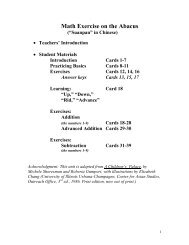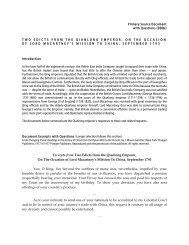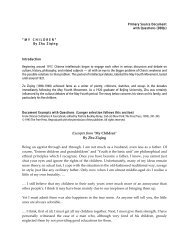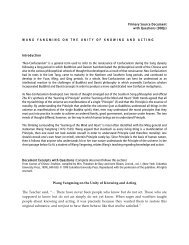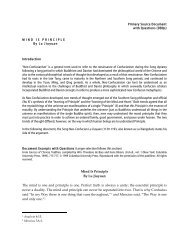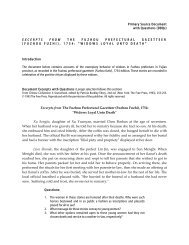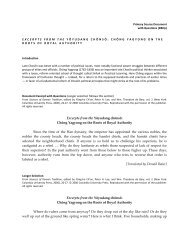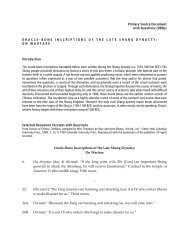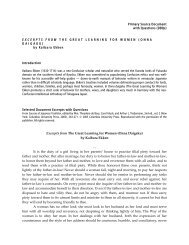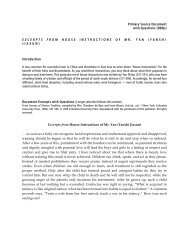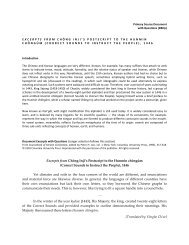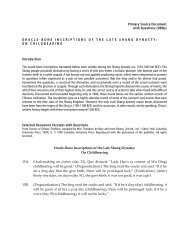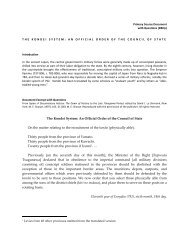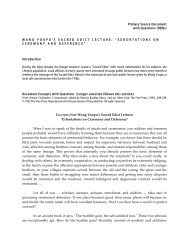Preface to the Great Learning - Asia for Educators - Columbia ...
Preface to the Great Learning - Asia for Educators - Columbia ...
Preface to the Great Learning - Asia for Educators - Columbia ...
You also want an ePaper? Increase the reach of your titles
YUMPU automatically turns print PDFs into web optimized ePapers that Google loves.
Primary Source Documentwith Questions (DBQs)P R E F A C E T O T H E GREAT LEARNING BY CHAPTER AND PHRASEBy Zhu XiIntroduction“Neo-Confucianism” is a general term used <strong>to</strong> refer <strong>to</strong> <strong>the</strong> renaissance of Confucianism during <strong>the</strong> Song dynastyfollowing a long period in which Buddhism and Daoism had dominated <strong>the</strong> philosophical world of <strong>the</strong> Chinese andalso <strong>to</strong> <strong>the</strong> various philosophical schools of thought that developed as a result of that renaissance. Neo-Confucianismhad its roots in <strong>the</strong> late Tang, came <strong>to</strong> maturity in <strong>the</strong> Nor<strong>the</strong>rn and Sou<strong>the</strong>rn Song periods, and continued <strong>to</strong>develop in <strong>the</strong> Yuan, Ming, and Qing periods. As a whole, Neo-Confucianism can best be unders<strong>to</strong>od as anintellectual reaction <strong>to</strong> <strong>the</strong> challenges of Buddhist and Daoist philosophy in which avowedly Confucian scholarsincorporated Buddhist and Daoist concepts in order <strong>to</strong> produce a more sophisticated new Confucian metaphysics.The Sou<strong>the</strong>rn Song philosopher and official Zhu Xi (1130-1200) is known <strong>for</strong> his syn<strong>the</strong>sis of Neo-Confucianphilosophy. However, his concerns went far beyond <strong>the</strong> abstractions of philosophy; his purpose was <strong>to</strong> change (andimprove, from his point of view) family life, society, and government. To this end, Zhu Xi was active in <strong>the</strong> <strong>the</strong>ory andpractice of education and in <strong>the</strong> compiling of a practical manual of family ritual.The document excerpted below is <strong>the</strong> preface <strong>to</strong> his commentary on two classic texts, The <strong>Great</strong> <strong>Learning</strong> and TheMean. In this excerpt, Zhu Xi discusses education.Document Excerpts with Questions (Longer selection follows this section)From Sources of Chinese Tradition, compiled by Wm. Theodore de Bary and Irene Bloom, 2nd ed., vol. 1 (New York: <strong>Columbia</strong>University Press, 1999), 722-725. © 1999 <strong>Columbia</strong> University Press. Reproduced with <strong>the</strong> permission of <strong>the</strong> publisher. All rightsreserved.<strong>Preface</strong><strong>to</strong><strong>the</strong><strong>Great</strong><strong>Learning</strong>byChapterandPhraseByZhuXiIn <strong>the</strong> flourishing days of <strong>the</strong> Three Dynasties [Xia, Shang, and Zhou] … everyone, from <strong>the</strong>king’scourtandfeudalcapitalsdown<strong>to</strong><strong>the</strong>smallestlaneoralley,hadschooling.At<strong>the</strong>ageofeight all children of <strong>the</strong> king and dukes, on down <strong>to</strong> <strong>the</strong> common people, started <strong>the</strong>irelementarylearning,inwhich<strong>the</strong>ywereinstructedin<strong>the</strong>[social]disciplinesofsprinklingandsweeping, responding <strong>to</strong> o<strong>the</strong>rs, and coming <strong>for</strong>ward or withdrawing from [<strong>the</strong> presence ofo<strong>the</strong>rs] [as recorded in Analects 19:12], and in <strong>the</strong> polite arts of ritual, music, archery,charioteering,writing,andarithmetic.Thenat<strong>the</strong>ageoffifteen,startingwith<strong>the</strong>heirapparentand o<strong>the</strong>r princes, and down through <strong>the</strong> legitimate sons of <strong>the</strong> dukes, chief ministers,grandees,andloweraris<strong>to</strong>cracy<strong>to</strong><strong>the</strong>talentedsonsof<strong>the</strong>commonpeople—allstarted<strong>the</strong>irhigherlearning,inwhich<strong>the</strong>yweretaught<strong>the</strong>wayofself‐cultivationandgovernanceofmenthrough<strong>the</strong>fathomingofprincipleandrectifyingof<strong>the</strong>mind.…
Primary Source Document, with Questions (DBQs) onP REFAC E TO TH E GREAT LEARNING BY CHAPTER AND PHRASE, BY ZHU XIQuestions:1. What distinction does Zhu Xi draw between people when he lays out hisideal program of education?2. What are <strong>the</strong> purposes of education <strong>for</strong> all children, from <strong>the</strong> nobility <strong>to</strong>commoners in <strong>the</strong> lanes and alleys?3. What are <strong>the</strong> purposes of <strong>the</strong> “higher learning” that Zhu Xi describes?4. Do you think that <strong>the</strong> system that Zhu Xi describes as being typical of <strong>the</strong>“Three Dynasties” actually existed? If not, why should Zhu Xi say that <strong>the</strong>ydid? Does it matter whe<strong>the</strong>r such a system really existed in <strong>the</strong> past?5. Compare <strong>the</strong> purposes of learning as described here with <strong>the</strong> purposes oflearning as seen in earlier Chinese texts (such as <strong>the</strong> Confucian Analects and<strong>the</strong> Xunzi) and in <strong>the</strong> texts of o<strong>the</strong>r civilizations.Longer SelectionFrom Sources of Chinese Tradition, compiled by Wm. Theodore de Bary and Irene Bloom, 2nd ed., vol. 1 (New York: <strong>Columbia</strong>University Press, 1999), 722-725. © 1999 <strong>Columbia</strong> University Press. Reproduced with <strong>the</strong> permission of <strong>the</strong> publisher. All rightsreserved.<strong>Preface</strong><strong>to</strong><strong>the</strong><strong>Great</strong><strong>Learning</strong>byChapterandPhraseByZhuXiThe Book of <strong>the</strong> <strong>Great</strong> <strong>Learning</strong> comprises <strong>the</strong> method by which people were taught in <strong>the</strong>higherlearningofantiquity.WhenHeavengivesbirth<strong>to</strong><strong>the</strong>people,itgiveseachone,withoutexception, a nature of humaneness, rightness, ritual decorum, and wisdom. They could not,however,beequalin<strong>the</strong>irphysicalendowments,andthus<strong>the</strong>ydonotallhave<strong>the</strong>capacity<strong>to</strong>knowwhatthatnatureconsistsinorhow<strong>to</strong>preserveitwhole.Oncesomeoneappearsamong<strong>the</strong>mwhoismostintelligentandwise,andablefully<strong>to</strong>develophisnature,Heavenissure<strong>to</strong>commission him as ruler and teacher of <strong>the</strong> myriad peoples, so that, being governed andinstructed, <strong>the</strong>y may be able <strong>to</strong> recover <strong>the</strong>ir original nature. This is how Fu Xi, <strong>the</strong> DivineFarmer, <strong>the</strong> Yellow Emperor, and [<strong>the</strong> sage kings] Yao and Shun succeeded <strong>to</strong> [<strong>the</strong> work of]Heaven, establishing <strong>the</strong> norm [<strong>for</strong> all <strong>to</strong> follow], and how <strong>the</strong>y came <strong>to</strong> set up <strong>the</strong> post ofMinisterofEducationand<strong>the</strong>officeofDirec<strong>to</strong>rofMusic.In <strong>the</strong> flourishing days of <strong>the</strong> Three Dynasties [Xia, Shang, and Zhou] <strong>the</strong>ir institutions weresteadilyperfecteduntileveryone,from<strong>the</strong>king’scourtandfeudalcapitalsdown<strong>to</strong><strong>the</strong>smallestlaneoralley,hadschooling.At<strong>the</strong>ageofeightallchildrenof<strong>the</strong>kinganddukes,ondown<strong>to</strong><strong>the</strong> common people, started <strong>the</strong>ir elementary learning, in which <strong>the</strong>y were instructed in <strong>the</strong>[social] disciplines of sprinkling and sweeping, responding <strong>to</strong> o<strong>the</strong>rs, and coming <strong>for</strong>ward orwithdrawingfrom[<strong>the</strong>presenceofo<strong>the</strong>rs][asrecordedinAnalects19:12],andin<strong>the</strong>politeartsof ritual, music, archery, charioteering, writing, and arithmetic. Then at <strong>the</strong> age of fifteen,startingwith<strong>the</strong>heirapparentando<strong>the</strong>rprinces,anddownthrough<strong>the</strong>legitimatesonsof<strong>the</strong>dukes, chief ministers, grandees, and lower aris<strong>to</strong>cracy <strong>to</strong> <strong>the</strong> talented sons of <strong>the</strong> common<strong>Asia</strong> <strong>for</strong> Educa<strong>to</strong>rs | <strong>Columbia</strong> University | http://afe.easia.columbia.edu Page 2 of 4
Primary Source Document, with Questions (DBQs) onP REFAC E TO TH E GREAT LEARNING BY CHAPTER AND PHRASE, BY ZHU XIpeople—allstarted<strong>the</strong>irhigherlearning,inwhich<strong>the</strong>yweretaught<strong>the</strong>wayofself‐cultivationandgovernanceofmenthrough<strong>the</strong>fathomingofprincipleandrectifyingof<strong>the</strong>mind.Thisisalso how <strong>the</strong> distinction was made in <strong>the</strong> gradations of elementary and higher instruction inschools.Thuswidelywereschoolsestablished,andthuspreciselydefinedwas<strong>the</strong>ar<strong>to</strong>finstructionin<strong>the</strong>detailsofitssequenceanditemizedcontent!As<strong>to</strong><strong>the</strong>reasons<strong>for</strong>providingthisinstruction,<strong>the</strong>y followed naturally from <strong>the</strong> superabundance of <strong>the</strong> ruler’s personal attention <strong>to</strong> <strong>the</strong>practiceofvirtueanddidnotneed<strong>to</strong>gobeyond<strong>the</strong>constantnormsthatgovern<strong>the</strong>people’slivelihoodandeverydayneeds.Thisbeing<strong>the</strong>case,<strong>the</strong>rewasnoonewithoutlearninginthosetimes, and as <strong>to</strong> <strong>the</strong> learning itself, no one would be without an understanding of what wasinherent in his individual nature or what was proper <strong>to</strong> <strong>the</strong> per<strong>for</strong>mance of his individualdutiessothateachcouldexerthimself<strong>to</strong><strong>the</strong>fullestexten<strong>to</strong>fhisenergies.Thisiswhy,in<strong>the</strong>greatdaysofhighantiquity,goodgovernmentprevailedonhighandbeautifulcus<strong>to</strong>msbelow,<strong>to</strong>adegreethatlaterageshavenotbeenable<strong>to</strong>attain.With <strong>the</strong> decline of <strong>the</strong> Zhou, sage and worthy rulers no longer appeared, and <strong>the</strong> schoolsystemwasnotwellmaintained.Thetrans<strong>for</strong>mationof<strong>the</strong>peoplethrougheducationbecameeclipsedandpopularcus<strong>to</strong>msdeteriorated.Atthattime<strong>the</strong>sageConfuciusappeared,butbeingunable<strong>to</strong>attain<strong>the</strong>positionofruler‐teacherbywhich<strong>to</strong>carryoutgovernmentandeducation,hecoulddonomorethanrecite<strong>the</strong>waysof<strong>the</strong>sagekingsandpass<strong>the</strong>malong,inorder<strong>to</strong>make<strong>the</strong>mknown<strong>to</strong>latergenerations.Thus,<strong>for</strong>instance,<strong>the</strong>reweresuchpiecesas<strong>the</strong>RitualMatters(Quli);LesserCeremonials(Shaoyi);Norms<strong>for</strong><strong>the</strong>Household(Neize)[chaptersof<strong>the</strong>Recordof Rites]andDuties of <strong>the</strong> Disciples(Dizi zhi)[from<strong>the</strong>Guanzi],whichwereonly<strong>the</strong>remnantsand byways of <strong>the</strong> original elementary learning. There was, however, this piece, <strong>the</strong> <strong>Great</strong><strong>Learning</strong>,whichfollowedupwhathadbeenaccomplishedinelementarylearningwithaview<strong>to</strong>setting<strong>for</strong>th<strong>the</strong>lucidteachingmethodsof<strong>the</strong>higherlearning.Thus<strong>for</strong>outwardemulation<strong>the</strong>re would be a model great enough <strong>to</strong> serve as <strong>the</strong> highest standard of perfection, and <strong>for</strong>innercultivationsomethingdetailedenough<strong>to</strong>spelloutinfullitssequenceandcontents.Nodoubt,among<strong>the</strong>threethousanddisciplesofConfucius,nonefailed<strong>to</strong>hearhisteachings,butitwasonlyZengziwhogot<strong>the</strong>essentialmessageandwrotethiscommentary<strong>to</strong>expounditsmeaning.Then,with<strong>the</strong>deathofMencius,<strong>the</strong>transmissionvanished.Thisworksurvived,but few unders<strong>to</strong>od it. Thereafter came <strong>the</strong> vulgar Confucian scholarship [of later times],stressing memorization and literary composition, which <strong>to</strong>ok double <strong>the</strong> exertion of <strong>the</strong>elementaryeducationbutwasofnorealuse,and<strong>the</strong>quietisticandnihilisticteachingsof<strong>the</strong>deviant doctrines [Buddhism and Daoism], which were loftier even than <strong>the</strong> higher learning(<strong>Great</strong> <strong>Learning</strong>) but lacked solid substance. Besides <strong>the</strong>se <strong>the</strong>re were <strong>the</strong> stratagems ofexpediency and <strong>the</strong> tactics and calculations [of <strong>the</strong> so‐called Strategists and Realists], all <strong>the</strong>o<strong>the</strong>r<strong>the</strong>oriesaimingatworldlypowerandsuccess,aswellas<strong>the</strong>teachingsof<strong>the</strong>HundredSchoolsandmyriadsplintergroupsthatconfused<strong>the</strong>worldandmisled<strong>the</strong>people,blocking<strong>the</strong>way<strong>to</strong>humanenessandrightness.All<strong>the</strong>seweremixed<strong>to</strong>ge<strong>the</strong>ringreatconfusion,sothat<strong>Asia</strong> <strong>for</strong> Educa<strong>to</strong>rs | <strong>Columbia</strong> University | http://afe.easia.columbia.edu Page 3 of 4
Primary Source Document, with Questions (DBQs) onP REFAC E TO TH E GREAT LEARNING BY CHAPTER AND PHRASE, BY ZHU XIgentlemen [rulers], alas, could no longer hear <strong>the</strong> essential teachings of <strong>the</strong> <strong>Great</strong> Way, andlessermenwerenolongerso<strong>for</strong>tunateas<strong>to</strong>enjoy<strong>the</strong>beneficialeffectsof<strong>the</strong>ultimateingoodgovernment. There were obscuration and obstruction; with <strong>the</strong> compounding of evils,everythingbecameincurablydiseased,until<strong>the</strong>disorderanddestructionreacheditsextremein<strong>the</strong>FiveDynasties[tenthcenturyC.E.].YetHeaven’scyclegoesonturning,andnothinggoes<strong>for</strong>thwithoutreturning[<strong>for</strong>anewstart].Thevirtuouspowerof<strong>the</strong>SongDynastyroseup,andbothgovernmentandeducationshonewith great luster, whereupon <strong>the</strong> two Cheng masters of He’nan appeared and connected upwith<strong>the</strong>traditionfromMencius[thathadbeenlongbrokenoff].Thefirsttruly<strong>to</strong>recognizeandbelieveinthiswork,<strong>the</strong>yexpoundedit<strong>to</strong><strong>the</strong>worldandfur<strong>the</strong>rrearranged<strong>the</strong>fragmentedtextsoas<strong>to</strong>bringoutitsessentialmessage.Withthat,<strong>the</strong>methodwhereby<strong>the</strong>ancientstaughtmenthrough<strong>the</strong><strong>Great</strong><strong>Learning</strong>with<strong>the</strong>guidanceof<strong>the</strong>classictex<strong>to</strong>f<strong>the</strong>Sage[Confucius]and<strong>the</strong>commentaryof<strong>the</strong>Worthy[Zengzi],wasonceagainmadebrilliantlyclear<strong>to</strong><strong>the</strong>world.Although I am not very clever, it was my good <strong>for</strong>tune through indirect association [with ateacher among <strong>the</strong> followers of <strong>the</strong> Cheng bro<strong>the</strong>rs] <strong>to</strong> hear about this. Considering that <strong>the</strong>workstillsufferssomedamageandloss,Ioverlookedmyownunworthinessandineptitude,andwentahead<strong>to</strong>ga<strong>the</strong>rup<strong>the</strong>fragments,rearrange<strong>the</strong>m,andinsertmyownideashereand<strong>the</strong>re<strong>to</strong>fillin<strong>for</strong>whatwasmissingand<strong>the</strong>nawait<strong>the</strong>judgmen<strong>to</strong>flatergentlemen.Realizingfullwellhowpresumptuousthisisofme,Iknow<strong>the</strong>reisnoway<strong>to</strong>escape<strong>the</strong>blame[<strong>for</strong>whatI have done], but I thought it might not be without some small benefit <strong>to</strong> our country ineducatingpeopleandimprovingcus<strong>to</strong>ms,andalso<strong>to</strong>scholarsasamethodof“self‐cultivation<strong>for</strong><strong>the</strong>governanceofmen.”SixteenthyearofChunxi(1189)Secondmonth,jiaziday(February20)ZhuXiofXin’an[Anhui]<strong>Asia</strong> <strong>for</strong> Educa<strong>to</strong>rs | <strong>Columbia</strong> University | http://afe.easia.columbia.edu Page 4 of 4



